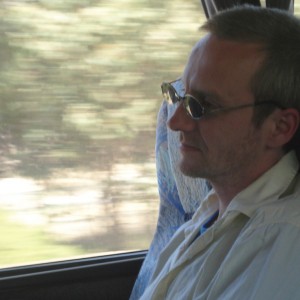I'm James Edwards, sometimes known as brothercake, and I'm a freelance web-developer, writer, and occasional presenter, specialising in JavaScript application development and building accessible websites.
I'm a strong advocate of accessibility and standards-based development, and much of my work is in finding ways to implement common functionality in an uncommonly accessible way. Clients want usable interactivity – things like drag and drop, slider controls, video players, or something more specialist – but which also functions correctly for people using the keyboard, or using assistive technologies like screenreaders and magnification software.
I've been working as a freelancer almost continuously since 2001, except for 2007-8 where I worked for SitePoint, in Melbourne, Australia. I've written hundreds of articles, and had three books published.
Hardware
I'm a bit out of date actually, but that can be helpful in itself – it's too easy for developers, working on the fastest most powerful machines, to develop interfaces that don't work so well on ordinary home computers. I have a 4GB MacBook with a 2.13Ghz dual-core processor – reasonably fast by home standards, but not so much by professional standards, and that's a compromise that seems to work quite well for me.
I also have a variety of smaller peripherals – an iPhone 4 that I organise my life with, an iPad 2 for working with touch interaction, a cheap Android tablet and a cheap Windows 7 Netbook, both used for low-spec device testing.
Software
Most of my working life is spent in a text-editor, BBEdit, and then in web browsers. I have dozens of different versions of every relevant browser, of which I typically run 4 or 5 at the same time. When I'm actually using the web myself, I prefer Opera.
I wouldn't be able to do my job without VMWare Fusion, which allows me to run virtual machines for testing different OS/browser combinations. So I have one VM for Windows 7 with IE11, one for Windows 7 with IE10 ... and so on, all the way down to Windows 2K Server with IE5 and IIS (though admittedly, that one doesn't get used much anymore!). In the past I've had VMs running Windows 95 with IE3, even Windows 3.1, but as time goes by the older ones get trashed and new ones have to be added. The most recent addition was Ubuntu 12 with Firefox, Konqueror, Opera and Chrome.
For image manipulation I use PhotoShop CS4 and very occasionally Illustrator. I run MAMP as my local development server, with PHP5 and MySQL. And to keep in touch with clients I've never strayed from Apple Mail, although I do need the SpamSieve plugin to clean out the hundreds of junk mails I get every day (as consequence of having published my email address on the web, and not changed it in 15 years!).
Dream
I'd be lying if I said I didn't want a more powerful MacBook! I'd like one with SSD and maybe a Retina screen, but I don't fancy the Air very much, they look too fragile. So my next purchase will probably be a MacBook Pro, with the latest OSX and twice as much RAM. But I'll still keep my current MacBook as well, so I can continue to test in something closer to what ordinary users have.
Inspiration
I don't have a background in computer science or mathematics, my background is in music and the arts, and my first experience of using a computer was building my first web site, on an old orange-gel iMac running Netscape 4 (in 2000). As I learnt to program, I've appreciated the rigours and discipline of thinking about problems in a logical way, but I don't think I've abandoned the more instinctive, artistic way of solving problems either.
I think that combination works really well for me, and it's my main inspiration – the fact that you don't need to be a computer genius to work on the web. And the web is such an open platform, such a free expression of ideas, that its very existence continues to be a source of inspiration as well. By building the web, I feel like I'm contributing to the evolution of human culture itself, towards a hoped-for future where barriers of power, politics, wealth or disability, no longer exist at all.
